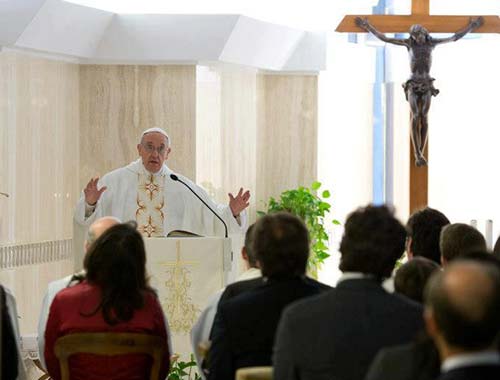Principle 6: When neither the rubrics nor the canons dictate what to do and reason does not provide a solution, the Roman Rite is a good place to start
The sixth principle, above, comes from Celebrating the Eucharist by Patrick Malloy (The first principle is here, the second principle is here, the third principle is here, the fourth is here, the fifth is here).
Some decision…simply cannot be reasoned through. [Many churches do not] for example,…have guidelines for how to perform the lavabo – the ritual washing of the presider’s hands. How should it be done and what, if anything, should be said? A congregation could logically decide whether to do the lavabo at all, and even how. But what the presider should say, if anything, is not a matter of logic. The Roman Rite prescribes that the presider quietly recite Psalm 51:2. Why not? Why struggle to come up with something else? (page 24)
Continuing that example, the Roman Rite is a good place to start when considering at which point in the service one would have the lavabo.
The Roman Rite has a special place in the West because it is so widely celebrated, and furthermore its rules and guidelines are very complete.
Many Western denominations look to the Roman Rite for such things as the liturgical colours, readings, texts. This common looking towards Rome, then, provides unity between denominations. At this time of year Methodists and Presbyterians use green not because they are drawing on each other, but because both refer to the Roman Rite.
The Vatican’s relatively recent abandonment of common English-language texts has done significant damage ecumenically and musically. This underscores the principle rather than arguing against it.




Like !
I agree with your article. I think there are several instances where the Roman Mass is less than perfect guidance. The first example is the placement of the Pax just before communion, rather than just prior the the Offertory. There is ancient precedent for both placements, and I think it is perfectly legitimate to opt for the Anglican placement rather than the Roman.
I am quite sad at the change to the common English texts in the RCC. I personally prefer the plain-ness of the common texts, and I find that some of the floweriness of the new translation doesn’t flow easily. I think the worst of it is the new translation of the Creed. I suspect that, by now, Catholics are so used to the new translations that they have stopped comparing. I am in attendance at an RC Mass infrequently enough that it is quite jarring to me.
Thanks, Lou. Yes, where the Anglican rite is quite clear is the placing of the Pax at the offertory – this “principle” is for situations where the rite is unclear. In NZ we have a rite with the option of placing the Pax to start the service – personally, I think that is confused. Blessings.
Those of us who have as our tradition the Roman Rite have not stopped comparing the revised texts (2010) with those of ICEL and ELLC. Any many a liturgist in the Roman tradition in the English speaking world oft would take up the NZ Prayerbook and other equivilents for inspiration. Liturgy in the end is more than the Eucharistic rite, but the table of the Eucharist has become somewhat distant by the language and let’s not begin to discuss the moves towards a revised Lectionary for the Roman Rite
I haven’t heard about such a revised Lectionary, Phillip. Can you point us to any online info on that? Blessings.
ICPEL was formed in 2003. But seems to have a problem of translation.
Ah, Phillip, a very good example of talking at cross purpose, and the way different people/denominations use words differently 🙂 . Others here will also think of “lectionary” to refer to the actual list and sequence of readings. You are using “lectionary” to refer to the English bound book of those readings in a Vatican-approved translation. Here was I thinking I’d missed out on some new idea to abandon the three year cycle. So yes, thankfully I knew of this, and thankfully there’s no plan to abandon our shared readings. Blessings.
I would say elsehow: «When, while celebrating according to the Roman Rite, neither the rubrics nor the canons dictate what to do and reason does not provide a solution, the Byzantine end Oriental Rites are good places to start.»